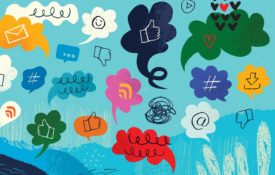-

Scientists Discuss How to Study the Psychology of Collectives, Not Just Individuals
In a set of articles appearing in Perspectives on Psychological Science, an international array of scientists discusses how the study of neighborhoods, work units, activist groups, and other collectives can help us better understand and respond to societal changes.
-

‘Forget I Said That’: The Evolutionary Drive to Disclose May Lead to Oversharing
The decision to share personal information may boil down to a battle between the drive for privacy and the drive to disclose, according to this recent article.
-
The Black Mamba Effect: Psychological Science Says Adopting an Alter Ego Boosts Confidence, Determination, and Performance
For years, whenever we asked each other for advice, my daughters and I often replied, "What would Granddaddy Haden do?" Usually, that would end the problem-solving: My dad would have chosen the hard way through, not the easy way out. "What would Granddaddy Haden do?" became shorthand for making a decision you could live with. While we didn't think of it that way, taking a step back to view a situation from his point of view was a form of self-distancing, helping us gain better control of our emotions and be more objective and logical.
-
How to Be Happy Growing Older
Next to one’s birthday, the passing of the calendar year induces us to reflect on the march of time in our life. This is not a welcome subject for many—which is perhaps why a lot of people simply redefine old age virtually out of existence. When Americans were asked in 2009 what “being old” means, the most popular response was turning 85. Yet the average life span in the United States in 2022 was only 76. Apparently, then, the average American dies nine years before getting old.
-
2023’s Mind-Bending Revelations in the Brain Sciences
This year was full of roiling debate and speculation about the prospect of machines with superhuman capabilities that might, sooner than expected, leave the human brain in the dust. A growing public awareness of ChatGPT and other so-called large language models (LLMs) dramatically expanded public awareness of artificial intelligence. In tandem, it raised the question of whether the human brain can keep up with the relentless pace of AI advances. The most benevolent answer posits that humans and machines need not be cutthroat competitors.
-

Is Our Early Attachment Our Destiny? Finding the Link Between Attachment Patterns and Personality Disorders
Podcast: Attachment is a recent popular topic that has entered the public eye, but psychological researchers have been investigating attachment patterns for decades. What is the relationship between early attachment personality disorders? Is there an overlap? Under the Cortex explores.

